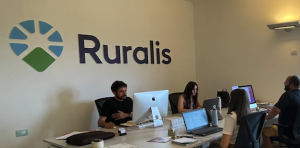Can you tell us about your background and experience in the business and international management field?
I am a young entrepreneur with a Bachelor’s degree in Business Economics from the University of Milano-Bicocca, Master’s degree in International Management from the University of Roehampton in England and MBA in Entrepreneurship from EU Business School in Germany and Spain. Passionate about entrepreneurship, I founded Ruralis in 2020 after gaining 2 years of experience in accounting in New York City.

What inspired you to start Ruralis and focus on rural tourism development?
I grew up in a rural village in the province of Avellino and I have seen directly the huge potential of rural areas as well as the very little digital approach by these communities.
How does Ruralis use technology to bridge the gap between tourists and rural tourism providers?
Ruralis solves a real problem in the rural short-term rental market: many properties are not online or on major booking platforms and face management issues. We use Advanced Technologies to improve visibility of the properties on all major OTAs (e.g. Booking, Airbnb, Expedia, Vrbo, etc.), to offer smart pricing through AI in line with the market and to develop a marketing strategy.
What sets Ruralis apart from other companies in the same industry?
Currently, in Italy, there is no company that focuses on the digital management of rural properties. Ruralis is one of the first startup born from a conservative culture that operates with a vision in line with large international technology companies. The goal is to consolidate us as the leading player for the digital transition of holiday homes in rural areas, making them competitive in the national and international market.
Can you tell us about the team at Ruralis and their background?
The Ruralis team is made up of young people (average age under 30), with international studies and work experiences, such as Lucio Nitti, the new Chief Operating Officer of Ruralis, who obtained a Master’s degree from Copenhagen Business School in Accounting, Strategy and Control and worked for ~3 years in multinational companies in London.

What have been some of the challenges and successes in growing Ruralis so far?
The main challenge has been to build trust and credibility, as we started from a little area where entrepreneurship can be found mainly within family businesses and young talents are forced to go away.
Among our success we can mention that we hosted +4000 tourists in 2022 (+348.95% vs 2021), from 26 different nationalities within the province of Avellino, as well as a the partnership with Princeton University where we hosted 20 American students for 40 days in a village called Gesualdo.
Where do your customers come from?
National and International tourists looking for comfortable and quality accommodation, far from the urban chaos.
-
Tourists in search of their origins, who return to visit their relatives or native places.
-
Tourists willing to travel about an hour by car and then visit the main tourist destinations such as the Amalfi coast, Pompeii, Capri or Naples.
-
Professionals who work for local companies or workers/managers involved in infrastructure projects.
How do you see Ruralis evolving and expanding in the future?
Our goal is to increase our expertise in rural areas and keep adapting to cultural differences that constitute barriers to entry into the international market. Ruralis aims to manage around 200 holiday homes by 2023 and 800 holiday homes by 2025 with a turnover of over €1.23 million and an EBITDA margin exceeding 18%.
 Size of the market
Size of the market
The Italian Accommodation market was €27.7 billion in 2022, with holiday homes representing 20-25% of the total size (Statista). Inland areas hold 22,7% of the Italian population (Agen. Coesione) and Ruralis seat inside right this unexplored market.
What are your long-term goals for Ruralis and its impact on rural tourism development?
Ruralis long-term vision is to become the main players specialized in the development of Rural areas, being our vision also in line with the European Union’s strategies for the development of rural areas. Furthermore, Ruralis takes active part in workshops of the European Commission related to rural development, being a member of the EU CAP Network and the EU Rural Pact.









